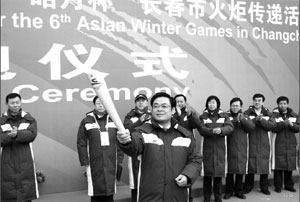Winter tourism has spurred economic growth in Changchun, capital of Jilin Province and a traditional snow and ice sports city in China.
|

Wang Rulin (middle), Party secretary of Changchun, holds up a relay torch for the Asian Winter Games on January 21, 2007. |
In Changchun, people believe that ice and snow are "resources" and the cold an "advantage", said Wang Rulin, Changchun's Party secretary.
According to local tourism authorities, winter tourism, skiing and trade-related ice and snow activities could create some 1 million yuan every day for the city.
The sectors in Changchun have been recognized as "snow industry."
The annual Changchun Ice and Snow Festival has been held for 10 years, becoming a grand platform for the city's economic development.
Taking the Jingyuetan Ski Resort, the largest venue for the annual festival, for example, the total investment has reached 40 million yuan.
The investment goes to the snow slopes, Jingyuetan Vasaloppet Snow and Ice Sports Park, Snow Sculpture Park, generating huge economic return.
The venue has kept an average profit rate of around 20 percent in recent years. In 2005, the total income there amounted to 10 million yuan.
|

The Wuhuan Gymnasium, with a construction area of 31,000 square meters, is the major venue for the Asian Winter Games.
|
During the 2005 Trade Fair for the Changchuan Snow and Ice Festival, the total investment for inked projects hit 5.57 billion yuan.
In 2006, the figure doubled, hitting 12.76 billion yuan. This year, the figure has risen to 21.7 billion yuan, showing the marvellous charm of the "snow industry."
Private capital plays an important role in the ice and snow industry. According to an official from the local tourism bureau, most of the large and medium-sized ski slopes in Changchun are funded by private capital.
The total fixed asset investment involved in the Jilin Lianhuashan Ski Resort has amounted to 500 million yuan, making it the largest ski chain group in China.
Due to the unique beauty and large high-quality ski facilities, more and more tourists are flocking to Changchun, injecting more vigor for the city's economic takeoff.
In 2000, the total number of tourists visiting the city was only 1.37 million, bringing the total income for the tourism sector to 416 million yuan.
 Owing to the expanding influence of the city's ice and snow industry, in 2006, a total of 5.1 million tourists came to Changchun, with 4.45 billion yuan for the city's tourism sector.
Owing to the expanding influence of the city's ice and snow industry, in 2006, a total of 5.1 million tourists came to Changchun, with 4.45 billion yuan for the city's tourism sector.
This year, the festival will last as long as 94 days, and a total of 30 activities such as Snow Carnival, Snow Fireworks Evening and "Snow Angel" Competition will make the city a spotlighted tourist resort in Northeast China during the beginning of 2007.
The event also brings the city a warm and festive atmosphere during the upcoming sixth Asian Winter Games, which open this weekend.
Job opportunities
A professor from the Tourism Institute of Changchun University said: "Snow tourism is related to six industries. One yuan of tourism income will drive 10.3 yuan in income for six other industries in Changchun."
Thus, he said, one job post in the tourism sector will create five other job opportunities in the city.
Since December last year, all city hotels above the three-star level have been booked. Many tourists are also interested in living in some villagers' homes, which boast a distinctive country style and are hard to find in metropolises.
A taxi driver said that many of his colleagues are so busy serving tourists that they can hardly find time for meals.
There are some 10,000 taxis in Changchun, and every taxi driver earns at least 50-100 yuan each day during the snow festival, far higher than other seasons.
According to the local government, some 10,000 residents in Changchun rely on "ice" and "snow": ice collecting, transportation and ice sculpturing create a huge workforce demand.
The maintenance of large snow slopes such as Jingyuetan and Lianhuashan also solves government headaches, by finding work for many laid-off workers.
In winter, farmers can also earn money by providing their horses to travellers to ski slopes.
"Changchun will make full use of its snow industry to make local residents' wallets swell," Wang said.
Unique advantage
The average winter temperature in Changchun is below 9.7 C, relatively warmer than some other traditional snow tourism cities in Northeast China, better satisfying the demand for travelers.
Changchun's snow period lasts 101 days, and the snow quality is good for snow sculpture.
With its location in the center of Northeast China, Changchun is within 300 kilometers of some 20 snow tourism resorts situated around the city.






 Owing to the expanding influence of the city's ice and snow industry, in 2006, a total of 5.1 million tourists came to Changchun, with 4.45 billion yuan for the city's tourism sector.
Owing to the expanding influence of the city's ice and snow industry, in 2006, a total of 5.1 million tourists came to Changchun, with 4.45 billion yuan for the city's tourism sector.
 RELATED
RELATED